ZAMBOANGA CITY | Street Food de Zamboanga
Monday, September 25, 2023
For street food aficionados, Zamboanga City is heaven. It has one of the most diverse selection of street foods in the Philippines—some of which, you can only find here. And as is the case with street food all over the globe, they’re extremely tasty and dirt cheap.

| ZAMBOANGA STREET FOOD TABLE OF CONTENTS ~ WHAT’S INSIDE?
|
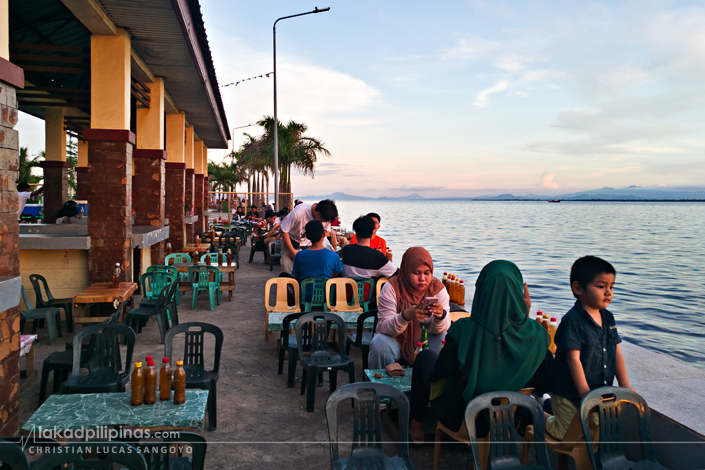 |
| STREET FOOD EATING AREA AT R.T. LIM BOULEVARD |
Street food in Zamboanga can be had from ambulant vendors roaming the streets, marketplaces, alleyways, parks, and boulevards. A couple of notable places to get them are on R.T. Lim Boulevard, especially during the afternoons; Paseo Del Mar, which is also a good place to hang out in during sundown; and the street food night stalls that pop up along the city—like at the Pettit Barracks Night Market and WMSU Road Street Market.
There’s more street food in Zamboanga City, and I will update this every time I visit.
SATTI
  |
| ZAMBOANGA’S FAMOUS SATTI |
One of the most popular street food in Zamboanga City is satti. Usually eaten for breakfast, these are barbecued little pieces of skewered meat—usually liver, chicken, or beef. These are then lathered with thick, slightly spicy, orange-colored gravy. It’s usually paired with tamu or puso, or rice cooked inside a weaved coconut leaves.
Satti eateries are everywhere in Zamboanga City, just ask a local and they will direct you to the nearest one. A piece of satti usually sells for about ₱8.00 to ₱10.00 per stick.
DURIAN
 |
| DURIAN BEING SOLD ALONG THE STREET |
Love it or hate it, durian is here to stay—well, especially in Mindanao. This fruit is readily available along streets of Zamboanga City, especially between the months of July to October. You can ask manong to break it open for you, then, simply use your bare hands to eat its sweet pungent meat.
There are ambulant vendors that roam the streets of Zamboanga selling durian fruits, but if you can’t find one, just head over to the nearest market. It usually costs about ₱90.00 per kilo.
UKOY
 |
| UKOY AT ZAMBOANGA’S MAGAY MARKET |
Similar in name and substance with the Tagalog okoy, a street food that is said to have originated from the province of Laguna, but different in form. Zamboanga’s ukoy is spherical—almost egg-like—is filled with togue (bean sprouts), and topped with a small shrimp on top. It’s best eaten hot and with a dash of spicy vinegar.
Ukoy de Zamboanga can be usually found along markets and are priced at around ₱5.00 to ₱10.00 apiece.
PASTIL TAUSUG
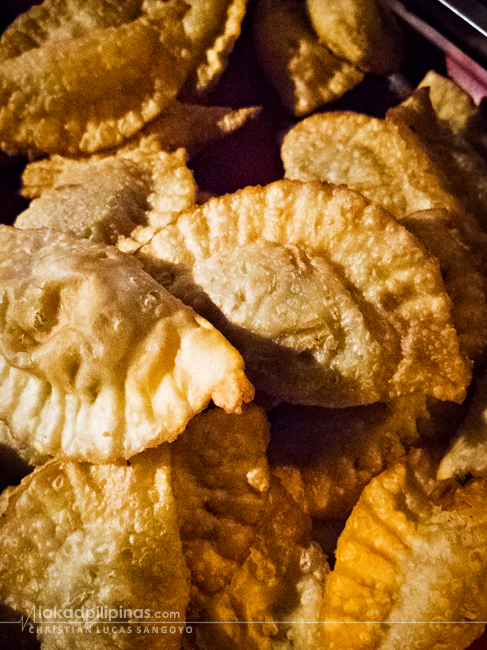  |
| PASTIL TAUSUG FROM THE MARKET AND FROM A RESTAURANT |
Empanada-esque in form but instead of the usual empanada fillings like pork or tuna, it is filled with togue (bean sprouts). Like ukoy, it is usually dunked or dashed with a helping of spicy vinegar.
These are also usually sold by ambulant vendors and along market places for about ₱5.00 to ₱10.00 apiece.
PATIL
 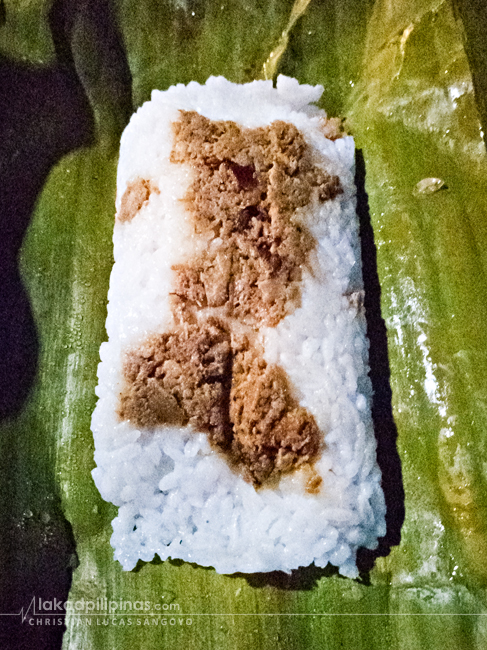 |
| CHICKEN PATIL FROM R.T. LIM BOULEVARD |
Wrapped in banana leaves, patil is steamed rice topped with savory kagikit or shredded chicken cooked in soy sauce, onion, garlic, and pepper. It’s usually consumed for breakfast, being an all-in-one meal in itself, but it can also be found during the other times of days—usually being hawked inside a Styrofoam box to keep it warm.
We found ours along the R.T. Lim Boulevard for ₱15.00 a piece.
ISAW
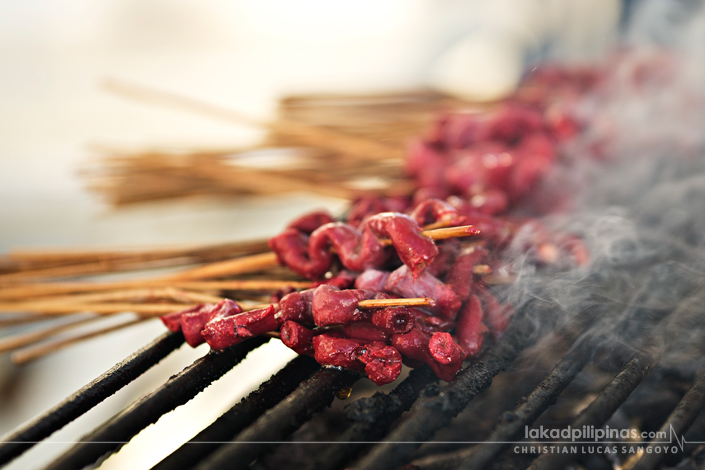 |
| BITE-SIZED ISAW AT PASEO DEL MAR |
Zamboanga’s chicken isaw or intestine, is slightly different from the usual ones in that they are much redder in color and are shorter—like a mouthful short. Meaning, a stick of isaw can be eaten in a single bite. And that also explains why it’s priced so cheap too.
We bought isaw along Paseo del Mar at only ₱5.00 a stick.
FISHBALLS
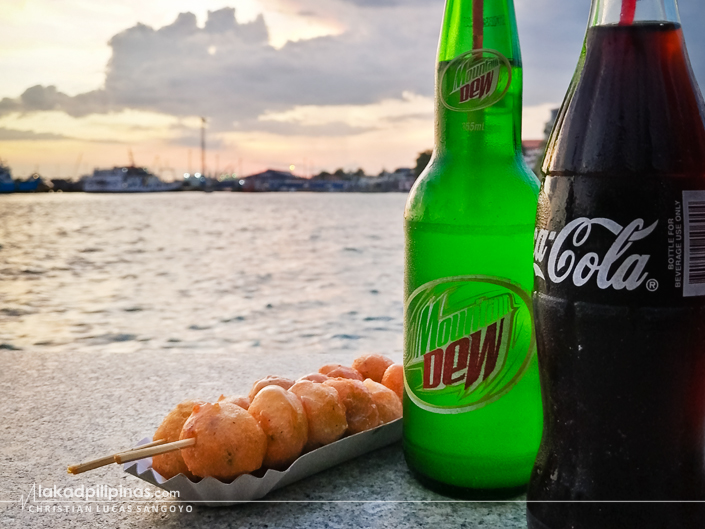 |
| SUNSET WITH FISHBALLS AND SOFTDRINKS AT PASEO DEL MAR |
Fishball is a popular street food in the country, and Zamboanga City’s version of it is better. The balls, are really balls and not flat, and it’s more porous—which is great for absorbing its sweet spicy dip. It actually looks more like kwek-kwek than fishballs.
This is readily available along the stalls at Paseo del Mar for only ₱10.00 a stick, which has six pieces of fishballs on it.
TEMPURA
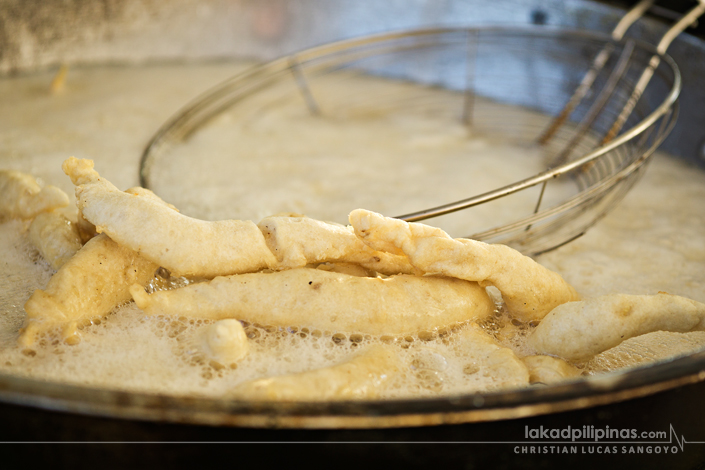 |
| TEMPURA BEING COOKED AT PASEO DEL MAR |
Popular in Dumaguete City, tempura can also be found in Zamboanga City. This, however, is not the Japanese dish everyone’s familiar with, but rather a kikiam-like street food, but longer in length, made from cuttlefish meat. It’s also deep-fried and dipped on the usual sweet/spicy manong sauce.
This can be brought along Paseo Del Mar for ₱10.00 a stick.
MEE GORENG
 |
| ZAMBOANGA’S VERSION OF MEE GORENG |
Originally from Malaysia, mee goreng or stir-fried noodles, is a popular snack in Zamboanga City. Usually served in halved styro pack, the noodles is from Mee Cap Udang, a Sabah product available in the city which has a similar texture to the instant noodles we’re familiar with. The noodles are cooked on a wok filled with soy sauce, sambal, and onions. It’s then topped with a fried egg and sometimes lathered with extra sauce that was used in cooking the noodles. A dash of spicy vinegar adds a kick to the dish.
A mee goreng meal cost about ₱50.00 and are usually sold along night markets and Malaysian restaurants in Zamboanga City.
KNICKER BOCKER
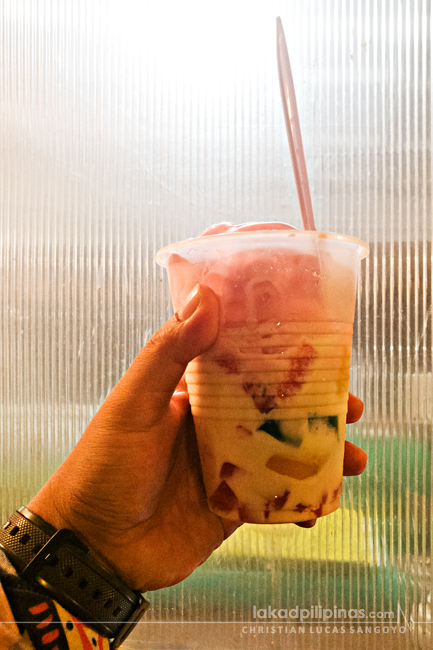 |
| ZAMBOANGA’S FAMOUS KNICKER BOCKER |
The original Knicker Bocker at Hacienda de Palmeras Restaurant is hardly street food. But since it has become readily available at Paseo Del Mar, along with its numerous clones all over the city, I can say that it’s since become a legit Zamboanga street food. It’s similar to halo-halo, but there’s no ice involved. Instead, the gelatin and fruits—like watermelon, peach, mango—are mixed with ice cream, specifically, vanilla and strawberry.
A plastic cup of the original Knicker Bocker is priced at ₱95.00.
TAHO
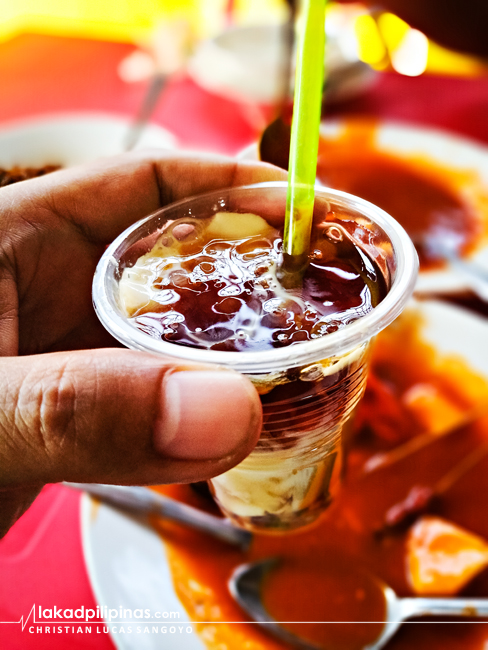 |
| TAHO IN ZAMBOANGA CITY |
Zamboanga’s taho is no different from the usual ones you and I are familiar with, but its sweetener is where it differs. Instead of using regular sugar, they use coconut sugar. The effect is that the taho is infused with a gata or coconut milk-ish flavor which makes Zamboanga’s version of it much more delicious.
A cup of taho sells for about ₱10.00 and are usually sold by street vendors in the morning.
APA
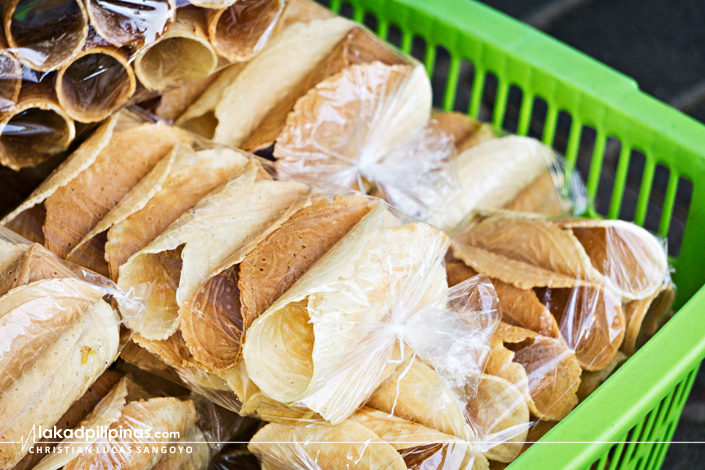 |
| APA ALONG FORT PILAR |
Somewhat similar to barquillos, apa is a uniquely Zamboangan street food. The rolled crispy wafer delicacy, sometimes also called martillos, is sold in pack of tens near Fort Pilar—which is only apt since its trademark stamp bears a resemblance to the altar of Our Lady of the Pillar shrine. It tastes like a sweet ice cream cone.
A pack of apa costs ₱20.00.
LOKOT LOKOT
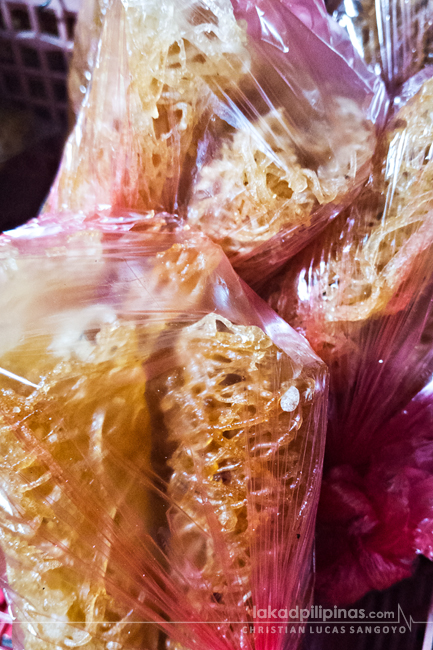 |
| LOKOT LOKOT SWEETS |
Another sweet delicacy that can be found near Fort Pilar is the lokot lokot. Also available in other parts of Mindanao, the sweet and crunchy snack is made from malagkit or glutinous rice—powdered, mixed in a batter, fried, then rolled into its final shape.
KIPING
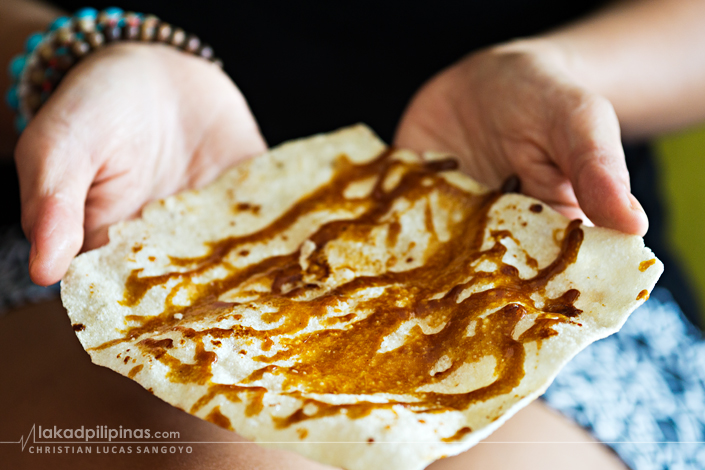 |
| KIPING LATHERED WITH SWEET SYRUP |
Made from fried pulverized cassava, kiping is a popular street food found in Mindanao where it takes form on other names like salvaro, kabkab, and burikit, among others. The crispy dish-like wafer is then lathered with sweet concoction of coco jam and calamansi.
A pack of kiping, which has three pieces, sells for ₱30.00 along Fort Pilar and market areas.
BEEF CHICHARON
  |
| BEEF CHICHARON AND BALUT AT R.T. LIM BOULEVARD |
It’s crunchy, it’s salty, it’s delicious. It’s chicharon, but it’s not. It’s not made from pork, but beef. And it tastes absolutely the same. It goes well with a balut or penoy, depending on your preference, and tastes even better with a spicy vinegar dip. Most stalls that sells these have a set of vinegar with varying degrees of spiciness—from “For Kids” to “Goodbye”.
The best place to get this is at the R.T. Lim Boulevard, and a pack sells for ₱15.00

iTravel Tourist Lane Zamboanga Tours
Address: Mayor Jaldon St., Canelar, Zamboanga City
Contact Number: (0917) 724-3199
Email: info@itraveltouristlane.com
Facebook | Website





























































0 comments